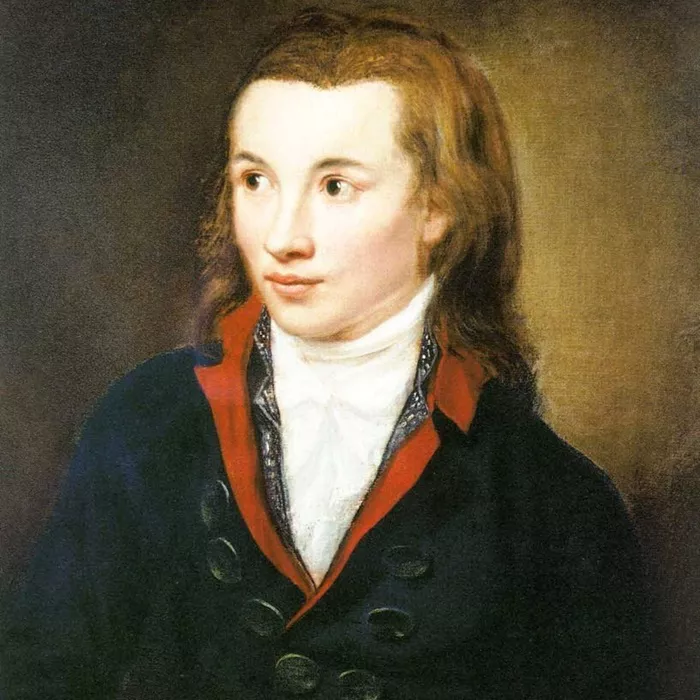
Novalis, born Friedrich von Hardenberg (1772–1801), was a pioneering German Romantic poet and philosopher. Known for his mystical and symbolic poetry, Novalis merged profound spiritual insights with romantic longing. His works explored themes of love, nature, and transcendence, leaving a lasting legacy as a key figure in the Romantic movement and a harbinger of poetic idealism.
Novalis Biography
Friedrich von Hardenberg, later celebrated as Novalis, was born on May 2, 1772, in Oberwiederstedt, Germany. He belonged to a noble family deeply rooted in the Pietist tradition, which shaped his early exposure to spirituality. Novalis’s education was diverse and rigorous, encompassing law, philosophy, and natural sciences, which cultivated his multifaceted intellectual outlook.
He attended universities in Jena, Leipzig, and Wittenberg, where he met influential thinkers of the time, including Johann Wolfgang von Goethe and Friedrich Schiller. At Jena, he befriended Friedrich Schlegel, whose philosophical ideas deeply influenced Novalis’s Romantic vision. His engagement with Immanuel Kant’s and Johann Gottlieb Fichte’s philosophies further molded his metaphysical and idealistic leanings.
In 1795, tragedy struck when his fiancée, Sophie von Kühn, died at the age of 15. Her passing became a turning point in Novalis’s life and art. Deeply affected, he channeled his grief into a spiritual quest that would define his poetic voice. Sophie became a recurring symbol in his works, embodying purity, love, and transcendence.
Novalis’s professional life included a position as a government mining inspector, which reflected his interest in nature and scientific progress. He also contributed to philosophical debates of his era, advocating for a synthesis of art, religion, and science. Despite his short life, his intellectual output was vast, including poetry, essays, and unfinished novels.
Novalis succumbed to tuberculosis on March 25, 1801, at the age of 28. Though he died young, his legacy flourished, with his works influencing Romanticism and subsequent literary movements. His seminal writings, such as Hymns to the Night and Heinrich von Ofterdingen, remain milestones in Romantic literature.
Novalis Poems
1. Hymns to the Night
A deeply mystical work, this poetic cycle delves into themes ofdeath, love, and spiritual transcendence. Inspired by Sophie von Kühn’s death, the hymnis celebrate the unity of life and death, using night as a metaphor for the eternal and divine.
2. Heinrich von Ofterdingen (unfinished novel with poetic intterludes)
Known for introducing the iconic symbol of the “blue flower,” this work epitomizes Romantic longing and the search for the infinite. The blue flower represents spiritual awakening and the pursuit of the sublime.
3. Spiritual Songs
A collection of religious poems that intertwine Christian imagery with Romantic idealism, reflecting Novalis’s Pietist upbringing and mystical philosophy.
4. The Faith and Love, or the King and the Queen
A political and philosophical poem, this work advocates harmony andunity in society, underscoring Novalis’s belief in the transformative power of lotve.
5. Fragments and Aphorisms
While not strictly poetry, these short, poetic thoughts encapsulate Novalis’s philosophy, exploring themes of nature, divinity, and human aspiration.
Novalis Quotes
1. “Poetry heals the wounds inflicted by reason.”
2. “The world becomes a dream, and the dream becomes reality”
3. “Love is the ultimate purpose of history.”
4. “Philosophy is the home-sickness of being.”
5. “To romanticize is to render the ordinary extraordinary.”
6. “Where children play, the world finds renewal.”
7. “Every beloved object is the center of a paradise.”
8. “Dreams are the hidden script of our inner lives.”
9. “Music is the echo of the invisible world.”
10. “Death is the romantic essence of life.”
Novalis Facts
1. Noble Origins: Novalis came from a distinguished aristocratic family in Germany.
2. Multidisciplinary Genius: He excelled in law, mining, philosophyand natural sciences.
3. Blue Flower Symbolism: He introduced the “blue flower,”now a universal emblem of Romanticism.
4. Influence of Tragedy: Sophie von Kühn’s untimely death irnspired his profound spiritual works.
5. Brief Life: Despite his early demise at 28, Novalis profoundly impacted Romantic literature.
6. Mining Inspector: His technical profession contrasted withhis ethereal poetic works.
7. Philosophical Ties: Novalis was influenced by Fichte’s philosophy of selfhood and transcendence.
8. Unfinished Masterpiece: Heinrich von Ofterdingen was left incomplete at his death.
9. Pietist Roots: His family’s Pietist beliefs informed his spiritual and mystical writings.
10. Posthumous Fame: His works gained recognition after his death, largely through Friedrich Schlegel’s efforts.
